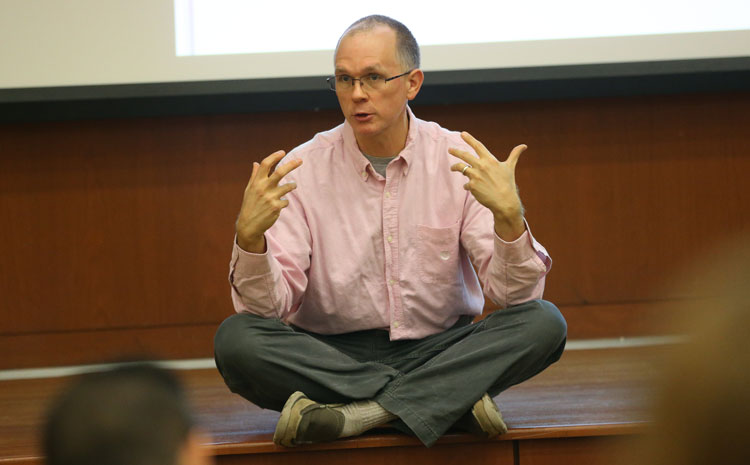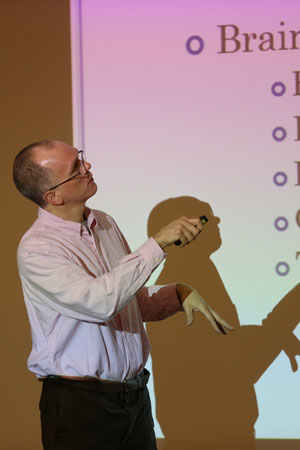
Morrie Mullins: The Humanitarian Side of Psychology
Nov 1, 2018
Since coming to Xavier 15 years ago to join the faculty in the School of Psychology, Morrie Mullins, PhD, has focused on teaching mostly graduate students about the scientific foundations required of skilled industrial-organizational (I-O) psychologists. Understanding the science behind the fast-growing field, he says, is key to helping organizations, usually large for-profit corporations, identify where they need to improve and how best to do it.
Along the way, however, Mullins discovered the softer side of I-O psychology. It’s called Humanitarian Work Psychology—and Mullins has become a total convert. He’s written a book chapter about it, has begun teaching it, and has joined the board of the Global Organisation for Humanitarian Work Psychology, which supports those who provide I-O psychology services to humanitarian organizations around the world.
“You apply I-O research principles to humanitarian organizations in parts of the world doing humanitarian assistance like in Haiti, Ghana, South Africa, even Europe,” he explains. “I’m interested because it’s very focused on issues of justice in a broad sense. And it dovetails beautifully with Xavier’s mission.”
Mullins is beginning to introduce the concepts of Humanitarian Work Psychology to his undergraduate Introduction to Psychology classes, but he’s been incorporating elements of it into his graduate classes for several years. And it’s paying off, as his graduate students often choose to work with non-profit organizations for their required research projects.
“Students in our program have done pro bono work for non-profits," he says. "We try to make sure our students get hands-on experience before they go into the job market.”
One project involved graduate students helping the Cincinnati Association for the Blind and Visually Impaired improve their services so they could serve more people. The students researched the work environment, conducted surveys and gathered data, and issued several recommendations to the agency.
“The idea was to incorporate new technology to use less paper and save money that could be used to improve services and reach more people,” Mullins says.
Another graduate student project was conducted for a foundation that helps families to care for and communicate with family members who have a chromosome condition known as 22Q13 Deletion Syndrome. Most people with the syndrome are unable to speak, so the students researched the needs of the families and developed a system to measure the level of communication attained by those with the syndrome.
“We built a way to measure the level of communication ability the person has reached—an assessment tool or benchmark to know where the patient is in terms of communicating,” Mullins says.
Mullins is also excited about the fact that Xavier’s Industrial Organizational Psychology program became a signatory to the UN Global Compact two years ago. That means Xavier supports educating people about and supporting the United Nation’s goal of sustainable development and the global elimination of poverty. As one of 12,000 members—and only the third I-O educational program to join—Xavier and its I-O program are in a unique position.
In a recent column he wrote for the Society of Industrial and Organizational Psychology newsletter, Mullins described how his students were surprised when he introduced Humanitarian Work Psychology into their graduate seminar class.
Matt Grabowski was one of those students. He said learning about the field dovetailed with his personal goals and changed the trajectory of his life by leading him to pursue his doctorate in psychology instead of joining the corporate world working in human resources. His research topic is race and gender relations in the workplace.
“This discussion was on how can we make the world better, what are things I-O psychologists can do to encourage companies to engage in social responsibility, and I thought that was really great that we set aside time to talk about the ethics of the job,” says Grabowski, who graduated from Xavier in 2017.
“I wasn’t expecting that. I was thinking in my career, I would carve out a niche about helping workers and people. Getting that exposure early on in the program helped direct what to do my thesis topic on, and it helped knowing there were people thinking about this and not just helping companies make more money.”
Mullins isn’t surprised at such reactions from his students.
“Given that Xavier is a Jesuit university, the principles are ones that fit nicely with what and how we already thought about educating our students, so now it's a matter of finding ways to do scholarly activity around the principles, including encouraging student theses on various relevant topics,” he says.
For students interested in studying psychology, supporting humanitarian efforts here and around the world is a fitting – and rewarding – reason to do so. Xavier's I-O psychology program makes that possible.
Learn more about Xavier's undergraduate Psychology program and the graduate Industrial-Organizational Psychology program.